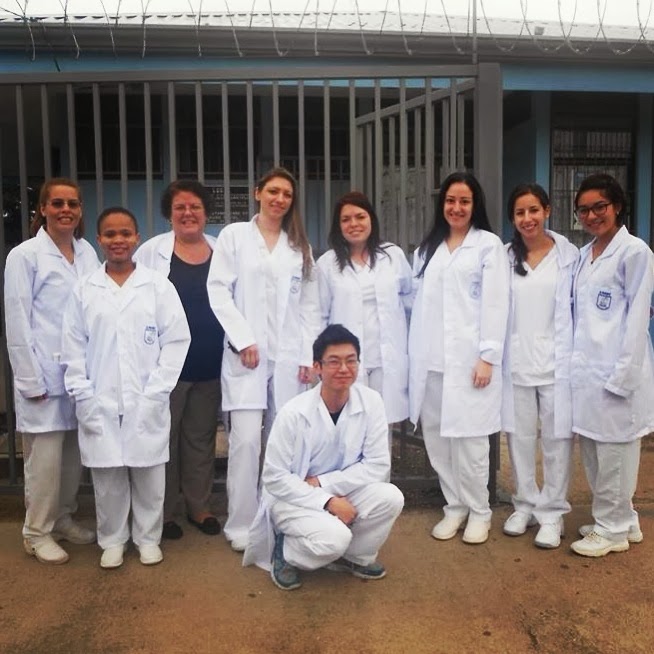Hello
again!
I arrived in San Jose, Costa Rica about a week and a half ago. The day I
arrived was my host-mother Adays' birthday. What better way for her to
celebrate her birthday than by having and welcoming me? ;) It has been
quite an experience thus far. Despite all of Costa Rica's imperfections, it is
so beautiful here. It is hard not being able to converse fluently with my
host-mom and other natives here. However, my professor speaks Spanish fluently
and we have three other UNIBE nursing students who help translate for us.
It was a little overwhelming at first, but at this point in time I feel
at home.
With the time difference only being an hour behind the United States, the days
here still seem so much longer. I have been very busy; my schedule is very
structured between clinical, Spanish class, and homework. I also have observed
rotations in hospitals and clinics. Aside from school, we still manage our time
for fun! This weekend we went zip lining through a rainforest, and we also took
a yacht to a private island called La Tortuga.
About three hours into our day at Tortuga Island we got called to
"duty". The professors from Boston, who my professor met earlier in
the day, came running for help as a man was seizing. I admit, I got a bit nervous
because it isn't everyday that you see someone seize or be able to tell such a
story. The man was quite young. We turned him on his side as we allowed him to
finish seizing. Luckily we knew he was conscious when he heard my professor
call his name. He was also able to move his extremities, which was a good sign.
I'm not quite sure if the woman who claimed she was a doctor was a part of his
party. Good thing we didn't allow her to put the knife in his mouth as a tongue
depressor. In the States, we were taught to never place anything in the
patient’s mouth as they seize because they could potentially aspirate or choke.
It was weird to see the man several more times throughout the day. I witnessed
him laughing and having a good time after the fact - it's a crazy thing how
life works. My time out here as made me appreciate life, and I am very grateful
and more appreciative. We are very fortunate in the States to have all that we
do.
 |
| Alexa and the other Nursing students with Professor Lama. |
The health care system is so unbelievably different. In Costa Rica, the medical
staff is all so welcoming and supporting. They have such a heart warming,
holistic approach in practicing medicine. It is a very relaxing environment,
Costa Ricans follow the phrase "PURA VIDA," meaning pure life. They
are very laid back and don't stress the small things in life. Everyone here
runs on "Tico time," and it is socially acceptable to be late. I am
still trying to get used to this because as you may know, we Americans are
always on the go or in a rush. There are so many differences that I have noticed here. In Costa Rica, the
pedestrians do not have the right of way, cars do! Their red light doesn't
necessarily mean they have to stop, they just "slightly yield."
 The most interesting patient that I observed in the Intensive Care Unit (ICU)
was a man who sustained intensive trauma due to a motorcycle vehicle accident -
he was not wearing a helmet. Unfortunately, I have seen many admissions similar
to this. It is amazing how well he is recovering from such injuries. They
reconstructed his whole face! He is able to talk and even has vision in both
eyes. Many people don't have the opportunity to have one kidney transplant, but
he was fortunate enough to get two! I am still amazed on how privacy here is
not a factor… they keep patient's records out in the open as well as their
names in clear view. I feel that Americans take life too seriously, we should
learn to live life more freely.
The most interesting patient that I observed in the Intensive Care Unit (ICU)
was a man who sustained intensive trauma due to a motorcycle vehicle accident -
he was not wearing a helmet. Unfortunately, I have seen many admissions similar
to this. It is amazing how well he is recovering from such injuries. They
reconstructed his whole face! He is able to talk and even has vision in both
eyes. Many people don't have the opportunity to have one kidney transplant, but
he was fortunate enough to get two! I am still amazed on how privacy here is
not a factor… they keep patient's records out in the open as well as their
names in clear view. I feel that Americans take life too seriously, we should
learn to live life more freely.
"Hacer
el bien, sin mirar a quien!" I saw this sign on the bulletin in the neuro
ICU unit. "Do good, without looking at whom." I loved the meaning,
and we are taught the same in the States. As a health-care provider, it is
important to treat every individual the same, and although each individual is
unique we must give them the same level of care.


No comments:
Post a Comment